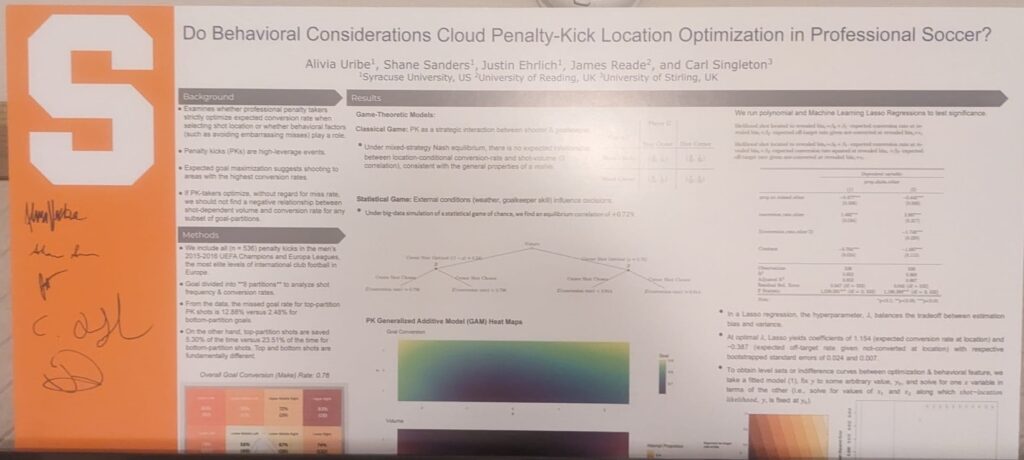Carl Singleton from the Economics Division, with co-authors Alivia Uribe (Uni. Syracuse), Shane Sanders (Uni. Syracuse), Justin Ehrlich (Uni. Syracuse), and James Reade (Uni. Reading), has won the prestigious research paper competition at this year’s MIT Sloan Sports Analytics competition, held in Boston on 7-8 March.

Professional footballers playing safe when it comes to taking penalties.
“Do Behavioral Considerations Cloud Penalty-Kick Location Optimization in Professional Soccer: Game Theory & Empirical Testing using Polynomial Regression and ML Gradient Boosting” is available to download on the conference website. The competition involved thousands of research papers submitted in Autumn 2024, 7 of which were presented at the conference this week (by Alivia, Shane, and James – in the picture above).
They say pride comes before a fall. But it can also come before an unsuccessful penalty kick. The research is based on 536 penalty kicks from the UEFA Champions and Europa Leagues. It reveals that those taking a penalty kick are sometimes sacrificing the most effective strategic shot placement and instead prioritising their credibility as professionals who “at least make the goalkeeper work”.
The results suggest that penalty kick takers are happy to trade off the chance of scoring a goal with looking like they missed a goal and that they made a mistake. The study draws comparisons to elite basketball players, such as Shaquille O’Neal and Andre Drummond, who have stated publicly that they won’t attempt underhand free throws despite evidence that they could improve their rates of scoring.
Dr Carl Singleton, Senior Lecturer in Economics at the University of Stirling said: “It seems like football players must care too much about missing the goal, because this looks like they’ve made a mistake that isn’t acceptable for a professional. Our findings show they are not shooting to areas of the goal where they would have a high chance of scoring a penalty kick. They are happy to trade off their chances of scoring a goal with looking silly. So, they’re not taking the shots to the top corner as often as they should.
“To the fans, coach and the team, missing the goal versus being denied by the goalkeeper is the same outcome, but to the player that distinction clearly matters.”
“It is important that football players learn that it’s OK to fail, and that any stigma attached to a particular negative outcome such as missing the target is minimised, so that players make optimal strategic decisions.”
